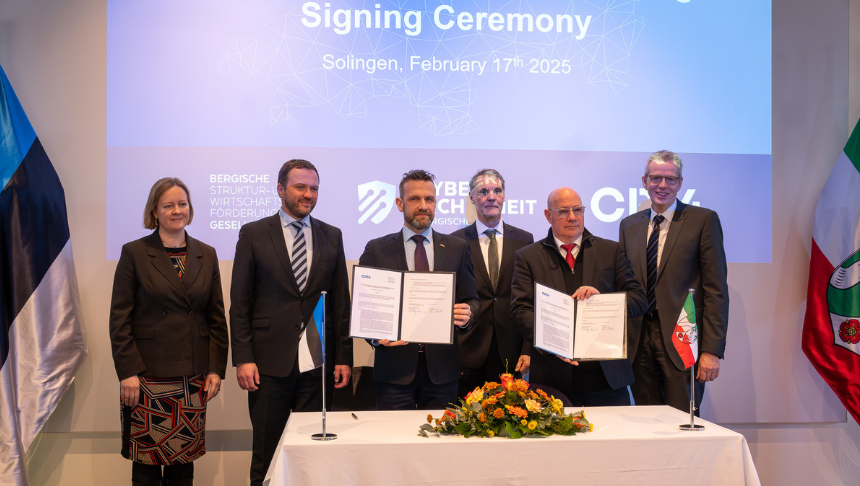CR14 elevates NATO's Cyber Coalition 2023 in Tallinn
NATO has concluded its largest annual cyber defence exercise, Cyber Coalition 2023, which collected 170 participants on-site at the CR14 in Tallinn, as well as more than 1300 cyber defenders from 35 NATO Allies and Partners.

Participants included the newest ally, Finland; Partner Nations Sweden, Georgia, Ireland, Japan, South Korea, Switzerland, and Ukraine; the European Union; and participants from industry and academia.
“Cyber Coalition is unique because it is the only cyber exercise in NATO that is not a competition. We all work together as a family of cyber defenders. This collaboration is what makes us stronger and more resilient to cyber threats. This year, the cooperation between all participants has been exceptional,” said Commander Charles Elliott, Cyber Coalition 2023 Exercise Director, United States Navy.
The NATO’s Allied Command Transformation-led annual exercise Cyber Coalition tests and trains cyber defenders from across the Alliance in their ability to defend NATO and national networks.
Cyber Coalition 2023 is also perfect for experimentation, driving cyberspace warfare and capability development. Experimentation is used, among other things, to test and validate concepts, capture requirements, or explore Emerging and Disruptive Technologies, focusing on improving the delivery of next-generation capabilities, material and non-material, to the warfighters. The Cyber Coalition experimentation campaign conducted three experiments aligned with the exercise scenario and the storylines:
- The mission analysis and decomposition experiment to help develop a methodology to analyse military missions in a way that can be easily mapped to cyber events;
- The cyber message centre’s capability to provide NATO with standard cyber message formats and with a tool already in use by the storylines to facilitate information sharing and automated exploitation;
- The cyber situational awareness platform enables operational validation of Bi-Strategic Command’s understanding of the concept, the capability requirements, and use cases.
Cyber Coalition 2023 is based on a challenging, realistic scenario where a powerful threat actor tries to compromise a NATO mission by conducting advanced and sophisticated cyber operations. These operations trigger the coordination and collaboration of participating NATO, allied and partner cyber defenders. The scenario helps prepare cyber defenders for real-life cyber challenges, including attacks on critical infrastructure and disruption of NATO and allied assets while in operations.
Supreme Allied Commander Transformation General Philippe Lavigne recently said, “Sharing is paramount. We share best practices by creating communities of military experts. We learn how to work together better through exercises and war games that we make as realistic as possible through modelling and simulation. […] By working together across nations at the military level, we benefit from each other’s experience. The lessons learned from different nations help us to better prepare for and adapt to evolving threats, thereby ensuring our collective resilience.”
Cyber Coalition is NATO’s flagship annual collective cyber defence exercise and one of the largest in the world. It is planned and conducted by Allied Command Transformation under the governance of the Military Committee. And it is running on the NATO Cyber Range, operated by CR14.
Building Cyber Resilience: CR14 and Bergische Struktur- und Wirtschaftsförderungsgesellschaft Join Forces
Cyber threats do not recognize borders, and neither should our defenses. As the digital landscape evolves, cross-border collaboration becomes essential in strengthening cybersecurity resilience. In line with this mission, CR14 has signed a Memorandum of Understanding (MoU) with Bergische Struktur- und Wirtschaftsförderungsgesellschaft mbH, marking the beginning of a strategic partnership between Estonia and Germany to advance cybersecurity innovation.
Read more

Building Cyber Resilience: CR14 and Bergische Struktur- und Wirtschaftsförderungsgesellschaft Join Forces
Cyber threats do not recognize borders, and neither should our defenses. As the digital landscape evolves, cross-border collaboration becomes essential in strengthening cybersecurity resilience. In line with this mission, CR14 has signed a Memorandum of Understanding (MoU) with Bergische Struktur- und Wirtschaftsförderungsgesellschaft mbH, marking the beginning of a strategic partnership between Estonia and Germany to advance cybersecurity innovation.
Modernizing Legacy Software: CR14’s First-Ever Scientific Publication
Legacy software is the backbone of many defence and security systems. While these systems were once at the forefront of innovation, they now present a significant challenge: how do we modernize mission-critical tools without disrupting their functionality or compromising security? At CR14, we don’t just ask these questions—we find the answers.
Read more

Modernizing Legacy Software: CR14’s First-Ever Scientific Publication
Legacy software is the backbone of many defence and security systems. While these systems were once at the forefront of innovation, they now present a significant challenge: how do we modernize mission-critical tools without disrupting their functionality or compromising security? At CR14, we don’t just ask these questions—we find the answers.